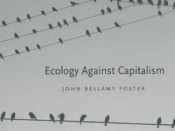Marx, it is often assumed, cared only about industrial growth and the development of economic forces. John Bellamy Foster examines Marx’s neglected writings on capitalist agriculture and soil ecology, philosophical naturalism, and evolutionary theory. He shows that Marx, known as a powerful critic of capitalist society, was also deeply concerned with the changing human relationship to nature.
Marx’s Ecology covers many other thinkers, including Epicurus, Charles Darwin, Thomas Malthus, Ludwig Feuerbach, P. J. Proudhon, and William Paley.
By reconstructing a materialist conception of nature and society, Marx’s Ecology challenges the spiritualism prevalent in the modern Green movement, pointing toward a method that offers more lasting and sustainable solutions to the ecological crisis.
Awards:
- Winner of the Best book award granted the Marxist Sociological Section, American Sociological Association, 2000
Editions:
- Portuguese language edition, (Rio de Janeiro: Civilização Brasileira, 2005).
- Korean language edition (Seoul: In-Gan-Sa-Rang Publishing Company, 2007).
- Japanese language edition, (Tokyo: Kobushi Forum/Sakai Agency, 2004), translated by Keiko Watanabe.
- Persian edition, containing a new “Preface to the Persian Language Edition,” (Tehran Digar Publishing House, 2004)—translator Akbar Masoumbeigi.
- Turkish language edition, (Ankara: EPOS, 2001)–contains new “Preface to the Turkish Edition” by the author.
- Indian edition, (KharagpurI, India:Cornerstone Books, 2001).
- Chinese language edition (Beijing: High Education Press, 2006).
- Finnish language edition, Publishing Company TA, 2001.
- Spanish language edition, Ediciones de Intervencion Cultural/El Viejo Topo, 2004.
- Indonesian language edition, translated by Pius Ginting (Jakarta: Wahana Lingkungan Hidup Indonesia, 2013).
Translations:
- Russsin-language translation by Yrii Trofimenko in process.
- German-language translation (Hamburg: Laika Verlag, 2012), translators Alp Kayserilioglu and Max Zirngast.



